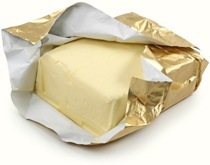Butter is a favorite spread and baking ingredient.
Yet when you store it in the refrigerator, it becomes hard, so you need to soften or melt it before use.
For this reason, some people store butter on the counter rather than in the fridge.
But does butter go bad if you leave it out? This article explores whether it actually needs to be refrigerated or not.
It Has a High Fat Content

Butter is a dairy product, meaning it is made from the milk of mammals — usually cows.
It is made by churning milk or cream until it separates into buttermilk, which is mostly liquid, and butterfat, which is mostly solid.
Butter is unique among dairy products because of its very high fat content. While whole milk contains just over 3% fat and heavy cream contains nearly 40% fat, butter contains more than 80% fat. The remaining 20% is mostly water (1, 2, 3, 4).
Unlike other dairy products, it doesn’t contain many carbs or much protein (3, 5).
This high fat content is what makes butter so thick and spreadable. However, when it is kept in the fridge, it becomes hard and difficult to spread.
This leads some people to store butter at room temperature, which keeps it at the ideal consistency for cooking and spreading.
Summary: Butter has a high fat content of over 80%, which makes it thick and spreadable. The rest is mostly water.
It Doesn’t Spoil as Quickly as Other Dairy

Because butter has a high fat content and relatively low water content, it is less likely to support bacterial growth than other types of dairy products.
This is especially true if the butter is salted, which lowers the water content further and makes the environment inhospitable to bacteria.
Salted Varieties Resist Bacterial Growth
According to the United States Food and Drug Administration (FDA), while most types of bacteria would be able to survive on unsalted butter, there is only one type of bacteria that can survive the conditions of salted butter (4).
In one study to determine the shelf life of butter, scientists added several types of bacteria to the butter to see how well they would grow.
After three weeks, the bacterial content was significantly lower than the amount added, demonstrating that butter doesn’t support most bacterial growth (6, 7).
Therefore, regular, salted butter has a low risk of bacterial contamination, even when kept at room temperature.
In fact, butter is actually produced with the expectation that consumers will not keep it in the fridge (4).
However, unsalted and whipped kinds are a different story.
But Don’t Let Your Butter Go Rancid
Although butter has a low risk of bacterial growth, its high fat content means it is vulnerable to going rancid. When a fat spoils, you can tell it should no longer be eaten because it will smell and may be discolored.
Fats go rancid, or spoil, through a process called oxidation, which alters their molecular structure and produces potentially harmful compounds. It also results in off flavors in any foods made with the rancid fats (8, 9).
Heat, light and exposure to oxygen can all speed up this process (8, 9).
Yet it has been demonstrated that it may take anywhere between several weeks to over a year for oxidation to negatively affect butter, depending on how it is produced and stored (6).
Summary: Butter’s composition discourages bacterial growth, even at room temperature. But exposure to light, heat and oxygen can cause rancidity.
It Stays Fresh Longer in the Fridge

Unsalted, whipped or raw, unpasteurized butter is best kept in the fridge to minimize the chances of bacterial growth (4).
Salted butter does not need to be stored in the fridge since the risk of bacterial growth is so low.
Studies have shown that butter has a shelf life of many months, even when stored at room temperature (6, 10).
However, it will stay fresh longer if it is kept in the refrigerator. Refrigeration slows down the process of oxidation, which will eventually cause butter to go rancid.
For this reason, it is generally recommended not to leave butter out for more than a couple of days or weeks in order to keep it at its freshest.
Additionally, if the temperature of your house is warmer than 70–77°F (21–25°C), it is a good idea to keep it in the refrigerator.
If you prefer to keep your butter on the counter, but don’t expect to use the whole package soon, keep a small amount on the counter and the rest in the fridge.
You can store larger amounts of butter in your freezer, which will keep it fresh for up to one year (10, 11).
Summary: Salted butter can be left out for several days to a couple of weeks before it goes bad. However, refrigeration keeps it fresh for longer.
Tips for Storing Butter on the Counter

While certain types of butter should be kept in the fridge, it is fine to keep regular, salted butter on the counter.
Here are a few tips you can follow to make sure your butter stays fresh when stored at room temperature:
- Only keep a small amount out on the counter. Store the rest in the fridge or freezer for future use.
- Protect it from light by using an opaque container or a closed cabinet.
- Store it in an airtight container.
- Keep it away from direct sunlight, the stove or other sources of heat.
- Store butter out of the fridge only if the room temperature stays below 70–77°F (21–25°C).
There are plenty of butter dishes specifically designed to meet most of these needs, but an opaque plastic storage container also works well.
Summary: Keep butter fresh at room temperature by using it quickly, storing it in an airtight container and protecting it from light and heat sources.
The Bottom Line
Keeping butter in the fridge maximizes freshness, while leaving it on the counter keeps it soft and spreadable for immediate use.
It’s fine to keep regular, salted butter out of the fridge, as long as it’s concealed from heat, light and air.
But anything you won’t use in a few days or weeks will stay fresher longer if you store it in the refrigerator or freezer.
On the other hand, salted, whipped or raw butter should be kept in the refrigerator.






